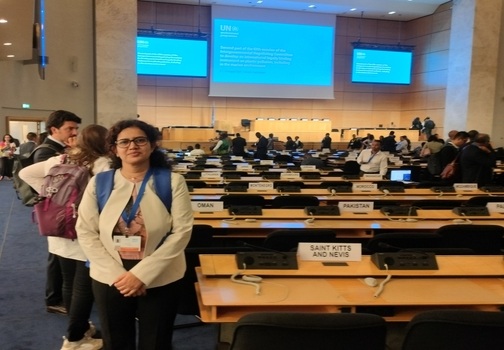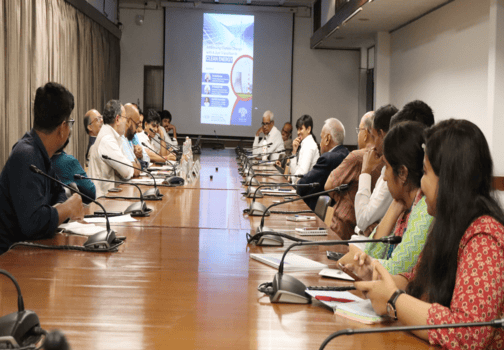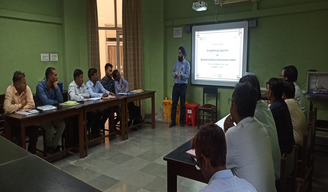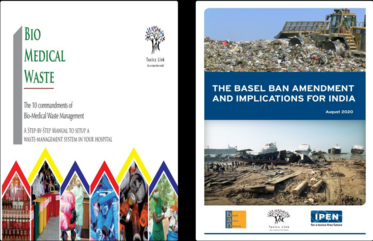Management of e-Waste
GOVERNMENT OF INDIA
MINISTRY OF ENVIRONMENT, FOREST AND CLIMATE CHANGE
LOK SABHA
UNSTARRED QUESTION NO. 3684
TO BE ANSWERED ON 24.03.2025
Management of e-Waste
3684. SHRI GURMEET SINGH MEET HAYER:
DR. KIRSAN NAMDEO:
SHRI ANTO ANTONY:
SHRI NAVEEN JINDAL:
SHRI BENNY BEHANAN:
DR. DHARAMVIRA GANDHI:
Will the Minister of ENVIRONMENT, FOREST AND CLIMATE CHANGE be pleased to state:
(a) the details of the current status of e-waste generation in the country, annually and the year-wise increase during the last three years;
(b) the mechanisms in place for e-waste collection, segregation and recycling, along with the role of the informal sector;
(c) the policy measures taken to regulate e-waste disposal and promote safe recycling practices;
(d) whether the Government has taken any initiatives to encourage refurbishment and reuse of electronic products to reduce e-waste, and if so, the details thereof;
(e) the details of international collaborations for e-waste management;
(f) the number of authorized e-waste recycling units operational at present and their processing capacity; and
(g) the steps taken to strengthen Extended Producer Responsibility (EPR) compliance and increase consumer participation in e-waste disposal?
ANSWER
MINISTER OF STATE IN THE MINISTRY OF ENVIRONMENT, FOREST AND
CLIMATE CHANGE
(SHRI KIRTI VARDHAN SINGH)
(a) to (c) Ministry has comprehensively revised the E-Waste (Management) Rules, 2016 and notified the E-Waste (Management) Rules, 2022 in November, 2022 and the same is in force since 1st April, 2023. The objective of the said rules is to take all steps required to ensure that e-waste is managed in a manner which protects the health and environment against any adverse effects which may result from such e-waste. These new rules intend to manage e-waste in an environmentally sound manner and put in place an improved Extended Producer Responsibility (EPR) regime for e-waste recycling wherein all the manufacturer, producer, refurbisher and recycler are required to register on a portal developed by the Central Pollution
Control Board (CPCB). The new provisions would facilitate and channelize the informal sector to formal sector for doing business and ensure recycling of e-waste in the environmentally sound manner. Provisions for environmental compensation and verification and audit have also been introduced. These rules also promote Circular Economy through EPR regime and scientific recycling/disposal of the e-waste.
The e-waste generation in the country has been assessed by CPCB based on the sales data and average life of notified electrical and electronics equipment (EEE) under regulations. The assessment exercise has been done on the basis of the sales data provided by the EPR Authorized Producers of 21 EEEs under the E-Waste (Management) Rules, 2016 and registered producers of 106 EEEs under the E-Waste (Management) Rules, 2022. The volume of e-waste generated and year wise increase during the last 3 years is as below:
|
Financial Year |
E-Waste Generation [Metric ]Ton MT) |
(Year wise increase (MT) |
|
2021-22 |
16,01,155 |
2,54,659 |
|
2022-23, |
16,09117 |
7,962 |
|
2023-24 |
17,78,400 |
1,69,283 |
As per the provisions of Rule 13 of the E-Waste (Management) Rules, 2022, all producers shall fulfil their EPR obligation and in doing so they may also take help of third party organisations such as producer responsibility organisations, collection centres, dealers etc. Further, the segregation and recycling is to be done through registered recyclers only. E- Waste Recyclers are registered based on their capability to recycle the e-waste in scientific and environmentally sound manner. CPCB has also developed guidelines for e-waste recyclers detailing facilities and procedures to be followed for scientific disposal of the e- waste.
(d) The refurbishment and reuse of EEE has been incentivized in the E-Waste (Management) Rules,2022. As per the provisions of Rule 14 (2) of the said rules, EPR obligation of a producer shall be deferred by the duration as laid down by the CPCB on production of refurbishing certificates purchased from the registered refurbishers.
To incentivise refurbishing, only 75 per cent of the deferred quantity shall be added to the extended producer responsibility of the producer for recycling upon expiry of the extended life of the refurbished product.
(e) International best practices are being followed in policy formulation and implementation of e-waste management rules in the country.
(f) & (g) As per the CPCB, currently there are total 322 authorised recyclers of e-waste having processing capacity of 22,08,918 MT in the country. Further, CPCB has taken following steps for effective management of e-waste rules:
(i) An online E-Waste EPR portal has been developed by CPCB wherein entities such as producers, manufacturers, recyclers and refurbishers of the e-waste are required to be registered.
(ii) CPCB has developed guidelines for the scientific and environmentally sound management of e-waste. The guidelines detail the procedures and facilities in terms
of machineries and pollution control devices required for the recycling of e-waste in environmentally sound manner.
(iii)An action plan for implementation of E-Waste (Management) Rules, 2022 is in place and the same is being implemented by all the State Pollution Control Boards (SPCBs)/Pollution Control Committees (PCCs) in their respective States/UTs. SPCBs/PCCs are submitting quarterly progress report. The action plan makes it incumbent upon SPCBs/PCCs to carry out regular drives for checking informal ewaste activities and help them to formalise.
(iv) The rules have provided verification and audit by the Central Pollution Control Board or through a designated agency to verify compliance of these rules through random inspection and periodic audit, as deemed appropriate, so as to take action against violations of these rules.
(v) The registered entities submit their compliance through Quarterly and Annual Returns on the E-waste Portal.
(vi) Environmental Compensation (EC) Guidelines under E-Waste (Management) Rules, 2022 have been developed for levying EC on any entity in case of violation of any of the provision of these rules and guidelines issued hereunder.
To increase the consumer participation in e-waste management, under the E-Waste (Management) Rules, 2022, the registered producers and recyclers have been given responsibility to create awareness. Consumers are regularly made aware on proper ways of e-waste management and are educated to hand over the e-waste to registered producer, refurbisher or recyclers. Producers and recyclers have been creating awareness through media, publications, advertisements, posters and other means of communication.






